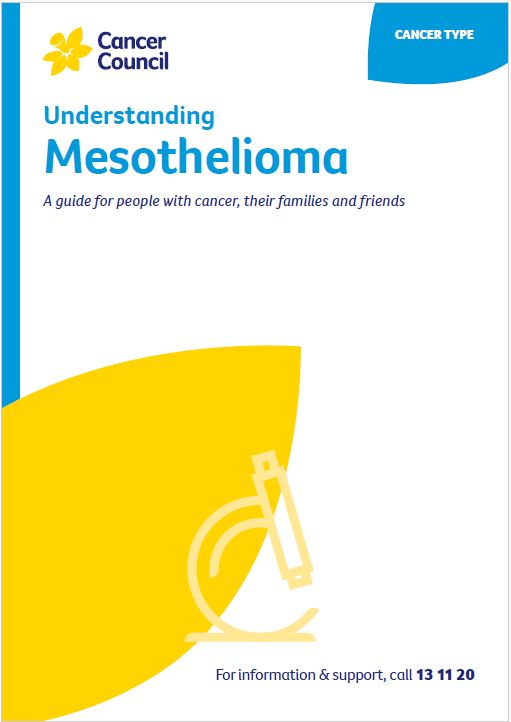- Home
- Peritoneal mesothelioma
- Treatment
Treatment for peritoneal mesothelioma
Treatment for people with peritoneal mesothelioma may be aimed at improving symptoms or trying to control the disease.
Learn more about:
Overview
The treatment options suggested by your health care team will vary depending on:
- the location, stage and type of mesothelioma, which helps doctors predict how the cancer will respond to treatment
- your age, health and fitness and home support available
- what is most important to you.
Deciding to have treatment
The cancer treatments we discuss here help control the disease for a longer period of time and improve quality of life for some people. It is important to talk to your treatment team about what each treatment involves, what side effects to expect and how long recovery will take.
Some treatments are not suitable for everyone. Even if a particular treatment is recommended, it is up to you whether or not you want to have it (see Making treatment decisions). You can also call Cancer Council 13 11 20 or talk to one of these mesothelioma support services.
Radiation therapy is rarely used for peritoneal mesothelioma. This is because the doses required to treat the whole abdomen would cause too much damage to surrounding organs. However, radiation therapy can be used for localised symptoms.
→ READ MORE: Making treatment decisions
Podcast: Making Treatment Decisions
Listen to more episodes from our podcast for people affected by cancer
Additional resources
-
Surgery Download PDF541kB
-
Chemotherapy Download PDF579kB
-
Immunotherapy Download PDF255kB
All updated content has been clinically reviewed by A/Prof Anthony Linton, Medical Oncologist, Concord Cancer Centre and Concord Repatriation General Hospital, NSW; Dr Naveed Alam, Thoracic Surgeon, St Vincent’s Private Hospital Melbourne and Monash Medical Centre, VIC; Prof David Morris, Peritonectomy Surgeon, St George Hospital and UNSW, NSW. This edition is based on the previous edition, which was reviewed by the following panel: A/Prof Anthony Linton (see above); Dr Naveed Alam, (see above); Donatella Arnoldo, Consumer; Polly Baldwin, 13 11 20 Consultant, Cancer Council SA; Dr Melvin (Wee Loong) Chin, Medical Oncologist, Sir Charles Gairdner Hospital and National Centre for Asbestos Related Diseases, WA; Prof Kwun Fong, Thoracic and Sleep Physician and Director, UQ Thoracic Research Centre, The Prince Charles Hospital, and Professor of Medicine, The University of Queensland, QLD; Vicki Hamilton OAM, Consumer and CEO, Asbestos Council of Victoria/ GARDS Inc., VIC; Dr Susan Harden, Radiation Oncologist, Peter MacCallum Cancer Centre, VIC; Penny Jacomos, Social Worker, Asbestos Diseases Society of South Australia, SA; Prof Brian Le, Director, Parkville Integrated Palliative Care Service, The Royal Melbourne Hospital and Peter MacCallum Cancer Centre, VIC; Lung Cancer Support Nurses, Lung Foundation Australia; Jocelyn McLean, Mesothelioma Support Coordinator, Asbestos Diseases Research Institute, NSW; Prof David Morris (see above); Joanne Oates, Registered Occupational Therapist, Expert Witness in Dust Diseases, and Director, Evaluate, NSW; Chris Sheppard and Adam Barlow, RMB Lawyers.
View the Cancer Council NSW editorial policy.
View all publications or call 13 11 20 for free printed copies.
